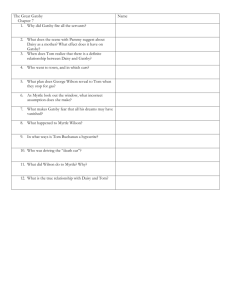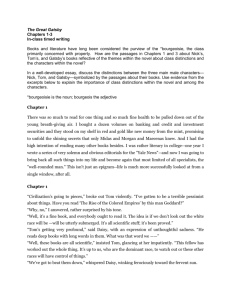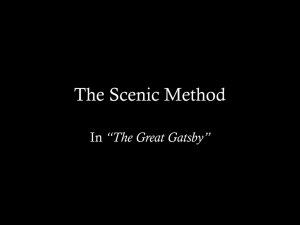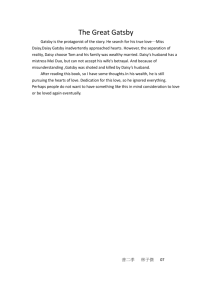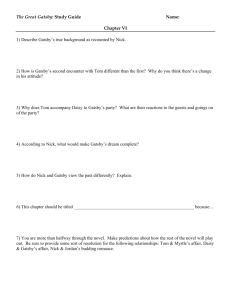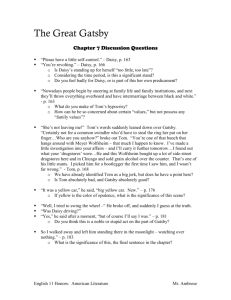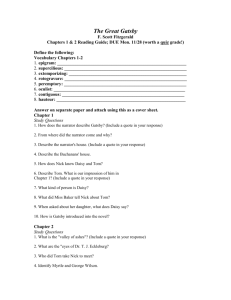THE GREAT GATSBY – chapter seven study guide
advertisement
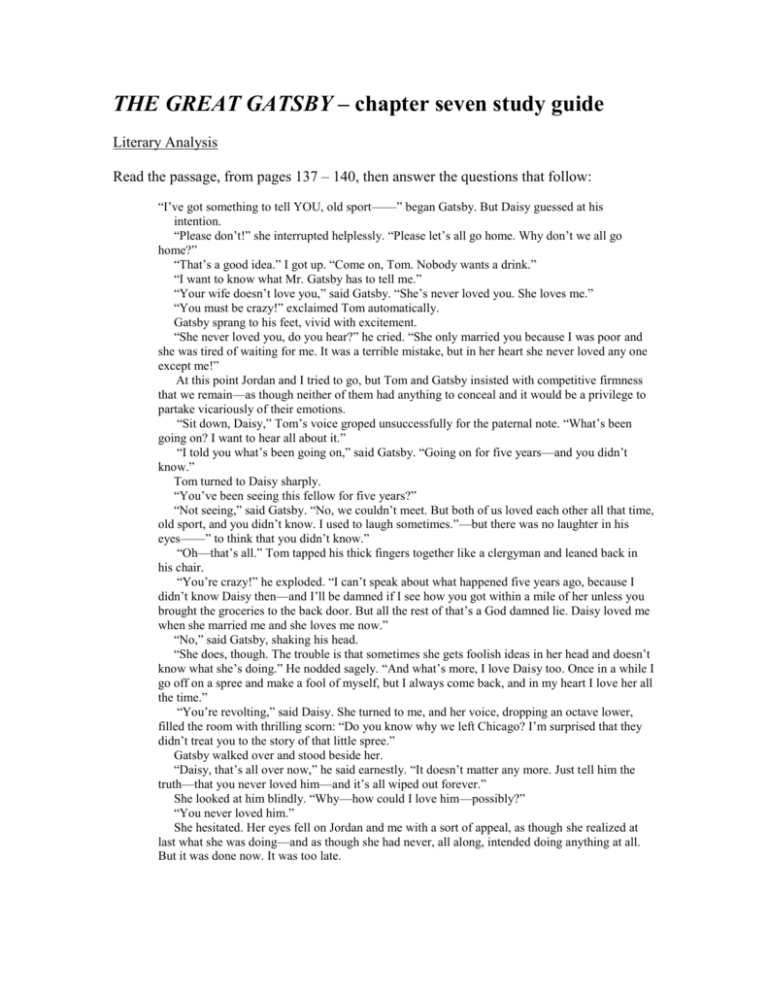
THE GREAT GATSBY – chapter seven study guide Literary Analysis Read the passage, from pages 137 – 140, then answer the questions that follow: “I’ve got something to tell YOU, old sport——” began Gatsby. But Daisy guessed at his intention. “Please don’t!” she interrupted helplessly. “Please let’s all go home. Why don’t we all go home?” “That’s a good idea.” I got up. “Come on, Tom. Nobody wants a drink.” “I want to know what Mr. Gatsby has to tell me.” “Your wife doesn’t love you,” said Gatsby. “She’s never loved you. She loves me.” “You must be crazy!” exclaimed Tom automatically. Gatsby sprang to his feet, vivid with excitement. “She never loved you, do you hear?” he cried. “She only married you because I was poor and she was tired of waiting for me. It was a terrible mistake, but in her heart she never loved any one except me!” At this point Jordan and I tried to go, but Tom and Gatsby insisted with competitive firmness that we remain—as though neither of them had anything to conceal and it would be a privilege to partake vicariously of their emotions. “Sit down, Daisy,” Tom’s voice groped unsuccessfully for the paternal note. “What’s been going on? I want to hear all about it.” “I told you what’s been going on,” said Gatsby. “Going on for five years—and you didn’t know.” Tom turned to Daisy sharply. “You’ve been seeing this fellow for five years?” “Not seeing,” said Gatsby. “No, we couldn’t meet. But both of us loved each other all that time, old sport, and you didn’t know. I used to laugh sometimes.”—but there was no laughter in his eyes——” to think that you didn’t know.” “Oh—that’s all.” Tom tapped his thick fingers together like a clergyman and leaned back in his chair. “You’re crazy!” he exploded. “I can’t speak about what happened five years ago, because I didn’t know Daisy then—and I’ll be damned if I see how you got within a mile of her unless you brought the groceries to the back door. But all the rest of that’s a God damned lie. Daisy loved me when she married me and she loves me now.” “No,” said Gatsby, shaking his head. “She does, though. The trouble is that sometimes she gets foolish ideas in her head and doesn’t know what she’s doing.” He nodded sagely. “And what’s more, I love Daisy too. Once in a while I go off on a spree and make a fool of myself, but I always come back, and in my heart I love her all the time.” “You’re revolting,” said Daisy. She turned to me, and her voice, dropping an octave lower, filled the room with thrilling scorn: “Do you know why we left Chicago? I’m surprised that they didn’t treat you to the story of that little spree.” Gatsby walked over and stood beside her. “Daisy, that’s all over now,” he said earnestly. “It doesn’t matter any more. Just tell him the truth—that you never loved him—and it’s all wiped out forever.” She looked at him blindly. “Why—how could I love him—possibly?” “You never loved him.” She hesitated. Her eyes fell on Jordan and me with a sort of appeal, as though she realized at last what she was doing—and as though she had never, all along, intended doing anything at all. But it was done now. It was too late. “I never loved him,” she said, with perceptible reluctance. “Not at Kapiolani?” demanded Tom suddenly. “No.” From the ballroom beneath, muffled and suffocating chords were drifting up on hot waves of air. “Not that day I carried you down from the Punch Bowl to keep your shoes dry?” There was a husky tenderness in his tone. . . . “Daisy?” “Please don’t.” Her voice was cold, but the rancor was gone from it. She looked at Gatsby. “There, Jay,” she said—but her hand as she tried to light a cigarette was trembling. Suddenly she threw the cigarette and the burning match on the carpet. “Oh, you want too much!” she cried to Gatsby. “I love you now—isn’t that enough? I can’t help what’s past.” She began to sob helplessly. “I did love him once—but I loved you too.” Gatsby’s eyes opened and closed. “You loved me TOO?” he repeated. “Even that’s a lie,” said Tom savagely. “She didn’t know you were alive. Why—there’re things between Daisy and me that you’ll never know, things that neither of us can ever forget.” The words seemed to bite physically into Gatsby. “I want to speak to Daisy alone,” he insisted. “She’s all excited now——” “Even alone I can’t say I never loved Tom,” she admitted in a pitiful voice. “It wouldn’t be true.” “Of course it wouldn’t,” agreed Tom. She turned to her husband. “As if it mattered to you,” she said. “Of course it matters. I’m going to take better care of you from now on.” “You don’t understand,” said Gatsby, with a touch of panic. “You’re not going to take care of her any more.” “I’m not?” Tom opened his eyes wide and laughed. He could afford to control himself now. “Why’s that?” “Daisy’s leaving you.” “Nonsense.” “I am, though,” she said with a visible effort. “She’s not leaving me!” Tom’s words suddenly leaned down over Gatsby. “Certainly not for a common swindler who’d have to steal the ring he put on her finger.” “I won’t stand this!” cried Daisy. “Oh, please let’s get out.” 1. What is symbolic about the location of this confrontation? 2. At what point does the conflict turn in Tom’s favor? Why? 3. How does Daisy’s throwing a lighted cigarette to the floor underscore the emotional effect of her words to Gatsby? 4. How do the “muffled and suffocating chords” from the ballroom echo the emotions of the characters in this scene? 5. What do the details of Tom’s behavior, including mannerisms and gestures, suggest about his level of confidence in the scene? Further literary analysis—study questions 1. Why does Gatsby say that Daisy’s voice is “full of money”? Why does Nick think “that was it”? 2. Why does Tom insist on driving Gatsby’s car, despite Gatsby’s distaste for the idea? Why does Tom call Gatsby’s car a “circus wagon”? 3. Why is Gatsby “content” once Tom has brought the affair with Daisy “out in the open at last”? 4. Why is Gatsby so upset when Daisy tells him that she did love Tom “once—but I loved you too”? 5. Why does Daisy draw “further and further into herself” as Gatsby tries to defend himself against Tom’s accusations? What are Daisy’s “intentions” and “courage” now “definitely gone”? 6. After Tom and Gatsby’s argument, why does Nick suddenly realize that it’s his thirtieth birthday? 7. Why does Gatsby admit to Nick that Daisy was driving the car when Myrtle was killed? 8. Why doesn’t Nick tell Gatsby that he saw Daisy and Tom “conspiring together”? Further considerations TONE shifts in the opening paragraph Sudden appearance (role) of the child in the chapter/no name given Emphasis on [hot] temperature throughout the chapter A sense (foreshadowing?) that the Wilsons will be involved in this chapter, early in the chapter Both a figurative (p. 125) and literal (p. 131) reference to the giant eyes of Doctor T. J. Eckleburg Many references (motif) to eyes throughout the chapter Both Tom and George’s mutual, yet at different times, discovery and their respective reactions Fitzgerald’s positioning of characters in two cars—why? (purposes for the plot…) Significance of Gatsby’s insight into his Oxford education Tom vs. Daisy, Tom vs. Gatsby, Gatsby vs. himself (Daisy) “I can’t help what’s past” (140) vs. (Tom) “I think he [Gatsby] realizes that his presumptuous little flirtation is over” (142) significance of “Don’t call me ‘old sport!’ “ cried Tom (141) Gatsby’s past via Tom’s investigation (Walter Chase): reliable information? - associate with Wolfshiem - “drug stores” (implied bootlegging) - jail time - gambling - “looked as if he had killed a man” (142) Gatsby’s denials, Daisy’s disinterest Nick turning 30: “The promise of a decade of loneliness” (143) Nick’s thought: “So we drove on toward death through the cooling twilight” (143)—drove on meaning more than simply driving in the car…see the last few lines of the novel… “death car”—significance of Daisy driving… “yellow car”—significance of Wilson knowing the [presumed] driver Nick thinks: “A new point of view occurred to me. Suppose Tom found out that Daisy had been driving. He might think he saw a connection in it—he might think anything.” (152) Nick observes: “They weren’t happy, and neither of them had touched the chicken or the ale— and yet they weren’t unhappy either.” (152)—analysis Nick narrates: “He [Gatsby] put his hands in his coat pockets and turned back eagerly to his scrutiny of the house, as though my presence marred the sacredness of the vigil. So I walked away and left him standing there in the moonlight—watching over nothing.” (153)—analysis: eagerly, scrutiny, marred, sacredness, vigil, nothing…

